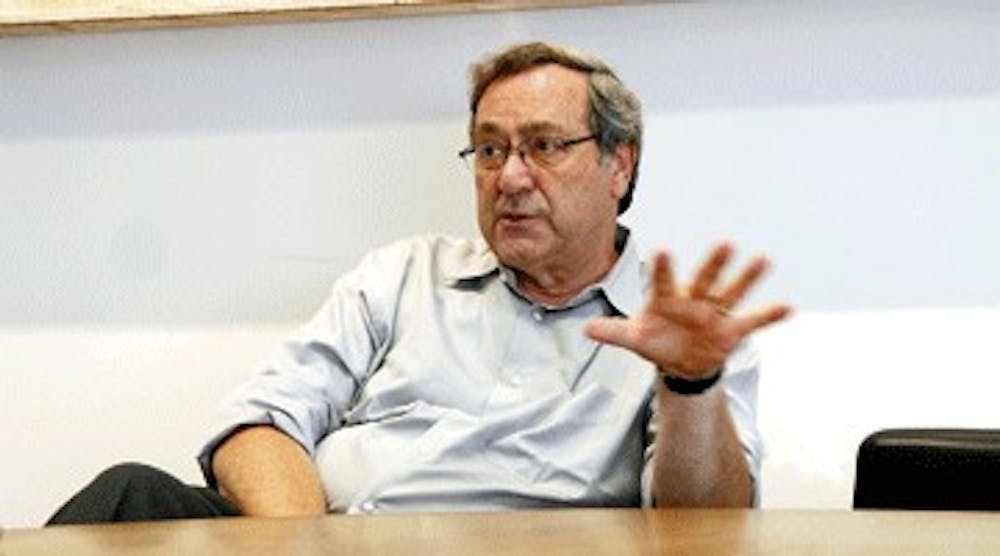
With the quiet grace of a conductor leading an orchestra of talented musicians, Dean Gary Hack has presided over the School of Design for the last 12 years.
And like any humble conductor, he's quick to praise the talents of his staff before his own.
"I've been the beneficiary of a lot of people who have done very well," said Hack, who steps down next week.
Hack has a reputation as a probing mentor, a quiet consensus builder and as "one of the outstanding urban designers of his generation," said Eugenie Birch, chairwoman of the School of Design's City and Regional Planning department.
The dean "is someone who has a very clear idea of where all the design professions should go," she said.
"He's a visionary."
***
Hack's attraction to cities began because he grew up in a small town in the Saskatchewan province of Canada, "a place that you can understand, know every piece of."
"The experience of being in cities that are complicated . it's a fascinating thing," he said.
He earned a B.A. in architecture from the University of Manitoba before getting master's degrees in both architecture and urban planning from the University of Illinois.
Thereafter, he became a large-scale urban planner, eventually working on projects from New York to Bangkok.
He began teaching in the evenings at the Pratt Institute in New York and then went to MIT for his Ph.D. in urban studies and planning.
After teaching at MIT for 25 years, he came to lead Penn's Graduate School of Fine Arts, which turned into the Graduate School of Design in 2003.
He liked the level of engagement that Penn had with Philadelphia, something he found lacking in Boston. He thought Philadelphia was ripe for new design. And Penn's combination of theory and practice impressed him.
At the time, Hack said, the GFA was suffering from a loss of faculty and resources.
Hack "really lifted the school out of a troubled spot when he took over," said Harris Steinberg, head of PennPraxis, the consultative arm of PennDesign.
He did this by integrating classroom and craft, encouraging engagement and supporting his staff.
Steinberg added that as a boss, Hack gave him "the longest leash or the longest noose," he's ever had.
The dean brought the school's four departments and one program together "under the common interest of good design" at all levels, said Birch.
Hack also engineered the school's name change to better reflect its mission.
"The change in title of the school is emblematic that all [forms of design] are encompassed in all the things he did," Birch said.
Since his arrival, the University has given him two opportunities for design: former President Judith Rodin's revitalization of West Philadelphia and President Amy Gutmann's plans for eastward expansion.
Hack was involved in the development of the Bookstore and the Inn at Penn, saw changes along the 40th Street corridor and helped oversee planning for the addition.
"Through his University citizenship, [Hack] has made a big mark on the new master plan" for Penn, Gutmann said.
"He helped create a culture [here] that really takes design seriously."
***
Hack's fingerprints extend beyond the University community to Philadelphia as well.
The School of Design Dean is typically the chair of the Philadelphia Planning Commission, and when Hack started working at the group, it "had gone into real disuse as an entity," he said.
The position "wasn't so easy for him because the [then-current] Street Administration had no interest in planning," said Inga Saffron, architectural critic at The Philadelphia Inquirer. Hack resigned after four years.
He said he's proud of the work he did while on the Commission, especially cleaning up neighborhoods and "changing the energy toward planning."
To address the perceived lack of planning by the Street administration, Hack and the Inquirer arranged a series of community forums about development on the Delaware Waterfront.
His involvement in these forums was a precursor to one of his major initiatives: a consulting practice under the umbrella of a university, so professors could both teach and create.
Hack then developed PennPraxis, which consults on matters of civic design.
"That was his real tremendous impact on the city," Saffron said.
It was Hack's "early and continued support [that] enabled us to create a new model for civic engagement and big planning" in Philadelphia, Steinberg said.
While Hack thinks both Philadelphia and Penn are better-positioned, he sees possible improvements, such as involving more undergraduates in practical arts and creating an environment through design conducive to growing jobs in Philadelphia.
And although he is stepping off the stage at PennDesign, his work in the field of urban design is not ending, as he moves on to new projects in the form of a conference on new energy and studying the challenges of living in post-peak oil world - with others, of course.
"The conductor doesn't call the shots . the conductor works with the talents of the musicians to produce a coherent sound," he said.
The Daily Pennsylvanian is an independent, student-run newspaper. Please consider making a donation to support the coverage that shapes the University. Your generosity ensures a future of strong journalism at Penn.
DonatePlease note All comments are eligible for publication in The Daily Pennsylvanian.







